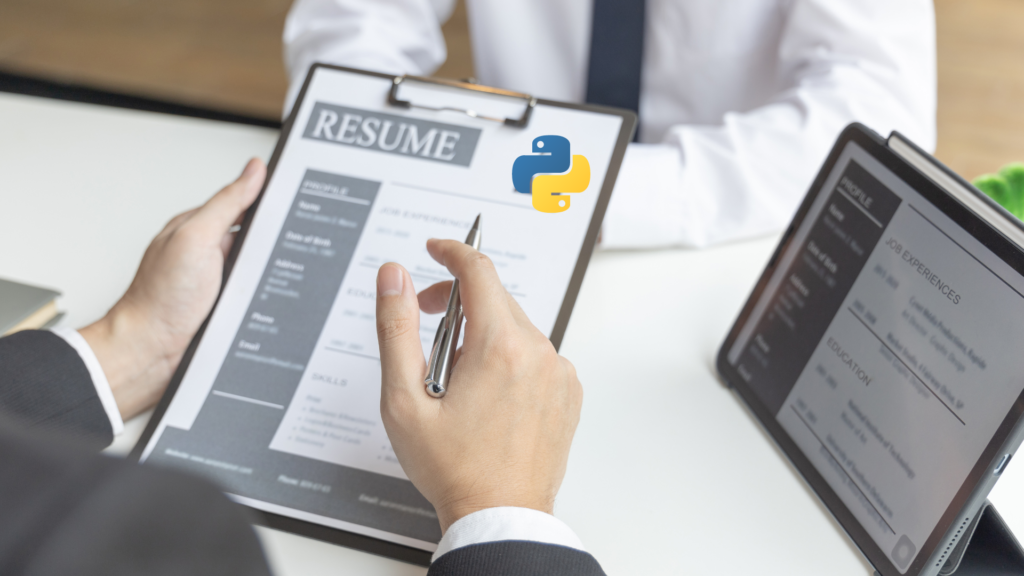Master Python Interview Preparation 2023
Introduction

In the world of programming, Python has become an incredibly popular language due to its readability, versatility, and extensive library support. As a result, interviews for Python developer positions are highly competitive. To help you ace your Python Interview Preparation 2023, we’ve compiled tips, important topics to cover, and frequently asked questions.
Tips for Python Interview Preparation
Understand the Basics
It’s essential to have a strong grasp of Python basics, including data types, loops, functions, and classes. Review these fundamental concepts and practice coding them to solidify your understanding.
Familiarize Yourself with Common Libraries
Python has an extensive ecosystem of libraries that can be used for various purposes. Knowing popular libraries like NumPy, Pandas, and TensorFlow can give you an edge during the interview.
Solve Coding Challenges
Regularly practice coding challenges on websites like LeetCode, HackerRank, and CodeSignal. These platforms offer problems tailored to Python and can help you improve your problem-solving skills.
Review Python Best Practices
Familiarize yourself with Python’s best practices, such as PEP 8 for coding style and PEP 20 (The Zen of Python) for guiding principles. This knowledge will help you write clean and efficient code during the interview.
Prepare for Behavioral Questions
Apart from technical skills, interviewers often assess soft skills like communication and teamwork. Be prepared to discuss your previous experiences and how they demonstrate your ability to work in a team setting.
Important Python Topics for Interviews
Data Structures and Algorithms
Study core data structures like lists, tuples, sets, and dictionaries, as well as algorithms like sorting, searching, and recursion. These topics are common in coding interviews and can help you solve complex problems.
- Python Algorithms by Magnus Lie Hetland: https://www.apress.com/gp/book/9781484200568
- Data Structures and Algorithms in Python by Michael T. Goodrich, Roberto Tamassia, and Michael H. Goldwasser: https://www.wiley.com/en-us/Data+Structures+and+Algorithms+in+Python-p-9781118290279
- GeeksforGeeks – Python Data Structures and Algorithms: https://www.geeksforgeeks.org/python-data-structures/
Object-Oriented Programming
Understand the principles of object-oriented programming, including inheritance, polymorphism, encapsulation, and abstraction. Be prepared to discuss the advantages of using OOP in Python and provide examples.
File I/O and Exception Handling
Learn how to read and write files in Python, along with handling exceptions using try, except, and finally blocks. This knowledge is essential for dealing with real-world programming scenarios.
- Python Crash Course by Eric Matthes: https://nostarch.com/pythoncrashcourse2e
- Python.org – Object-Oriented Programming: https://docs.python.org/3/tutorial/classes.html
- Python.org – Input and Output: https://docs.python.org/3/tutorial/inputoutput.html
- Python.org – Errors and Exceptions: https://docs.python.org/3/tutorial/errors.html
H3: Regular Expressions and Web Scraping
Regular expressions are crucial for text processing and pattern matching. Additionally, web scraping using libraries like Beautiful Soup and Requests can be a valuable skill for data extraction tasks.
H3: Multithreading and Multiprocessing
Demonstrate your understanding of Python’s threading and multiprocessing libraries for handling concurrent tasks, and explain the differences between the two.
- Python.org – Regular Expression HOWTO: https://docs.python.org/3/howto/regex.html
- Web Scraping using Python and BeautifulSoup: https://www.crummy.com/software/BeautifulSoup/bs4/doc/
- Python.org – Concurrent Execution: https://docs.python.org/3/library/concurrency.html
Frequently Asked Questions (FAQs)
What is the Global Interpreter Lock (GIL) in Python?
The GIL is a mutex that prevents multiple native threads from executing Python bytecodes concurrently. It is necessary because CPython’s memory management is not thread-safe.
How does Python manage memory?
Python uses a combination of reference counting and garbage collection for memory management. The garbage collector, specifically, handles cyclic references that reference counting cannot detect.
What are the differences between Python 2 and Python 3?
Python 3 introduced several changes, such as print becoming a function, integer division returning floats, and Unicode strings becoming the default. Python 2 reached its end of life in 2020 and is no longer maintained.
What are Python decorators?
Decorators are a way to modify the behavior of functions or classes without changing their code. They are implemented as higher-order functions that take a function as input and return a new function with
the modified behavior.
What is the difference between a list and a tuple in Python?
The main difference between lists and tuples is their mutability. Lists are mutable, meaning their elements can be changed after creation, while tuples are immutable and cannot be altered once created. Tuples generally have a lower memory overhead and faster access time compared to lists.
What are list comprehensions?
List comprehensions are a concise way to create lists in Python. They consist of an expression followed by a ‘for’ clause and optionally one or more ‘if’ clauses. List comprehensions are more efficient and readable compared to using loops to create lists.
What is the difference between the “is” and “==” operators in Python?
The “is” operator checks if two variables refer to the same object in memory, while the “==” operator checks if the values of the two variables are equal.
H3: What are *args and **kwargs in Python?
*args and **kwargs are special syntax in Python for passing a variable number of arguments to a function. *args is used for non-keyword (positional) arguments, while **kwargs is used for keyword arguments.
Conclusion
Python interview preparation for 2023 requires a strong foundation in the basics, familiarity with popular libraries, and practice solving coding challenges. By mastering these topics and anticipating common interview questions, you’ll be well-equipped to stand out in the competitive Python job market. Good luck!

